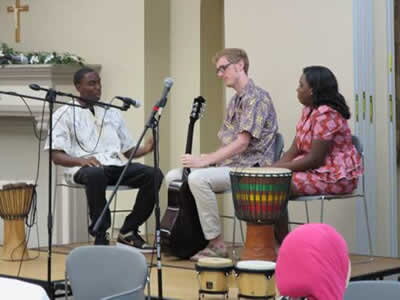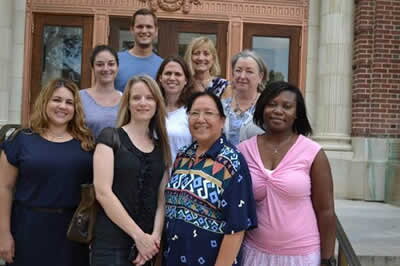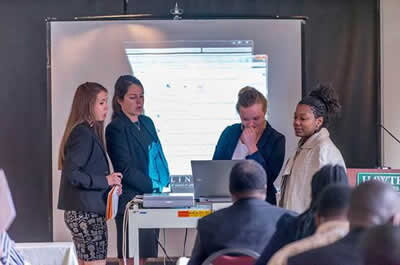
2015 Summer Institute for the Languages of the Muslim World (SILMW)

Swahili Students Performing at the SILMW Showcase
The Summer Institute for Languages of the Muslim World (SILMW) is an annual intensive language institute held at the University of Illinois at Urbana-Champaign that focuses specifically on teaching critical languages spoken in the Muslim World. In Summer 2015 the Institute offered classes in seven languages: Arabic, Persian, Swahili, Turkish, Urdu, Uzbek, and Wolof. Due to the intensive nature of the program, classes are held four hours a day and students cover the same amount of material over eight weeks that they normally take two semesters to learn. The program is designed to give students as much exposure to their target language as possible over a short span of time—to mimic the type of immersive experience that facilitates quick language learning. In addition to activities that focus on language use, such as classes and conversation tables, students also take part in a variety of co-curricular cultural activities that focus more broadly on the culture and traditions of the regions they are studying. These co-curriculars include cooking classes, movie showings, and cultural and historical lectures. The goal of these activities and of the program as a whole is to create a learning environment for students such that they will walk away with knowledge of the culture, grammar, and broader context in which the languages they are learning are used. A number of students mention specifically that their experience at the Institute differs from their experience in other summer classes, precisely because of the conversation tables, field trips, and other experiences that go beyond the classroom to facilitate more holistic learning. The culmination of the Summer Institute is the Showcase where all of the students from every class do some type of presentation or performance to highlight what they have learned of the language and culture. This year’s performances included skits and videos—for example, singing of a popular Tanzanian song—and much more. After the performances, students and guests helped themselves to delicious food and celebrated the huge accomplishments of their eight-weeks of hard work.
The Bridging Cultures Initiative: Local and Global Perspectives in Education, summer 2015

Participants in 2015 Bridging Cultures Initiative
During the summer of 2015, teachers from across the United States participated in The Bridging Cultures Initiative titled “Local and Global Perspectives in Education.” The purpose of the event was to fulfill the university’s mission to internationalize our community, and American education in general, by promoting new understandings of global education in schools. High School teachers were paired with secondary educators from 20 different nations for a one-week intensive summer program of cultural conversations, curriculum design clinics, and joint pedagogy workshops. The summer residential program set the groundwork for continued cultural exchange. One third of the international educators came from African countries and took part in the Global Institute for Secondary Educators program, “The American Dream: The Self-Fulfilling Prophecy of a Cultural Heritage.” Both events were sponsored by the U.S. Department of Education and supported with funds from the Title VI grant.
Health in Africa and the Post-2015 Millennium Development Agenda

Colgate University Students with conference organizer, Professor Diana Grigsby-Toussaint (far right)
From May 20, 2015 to May 22, 2015, more than 100 leading scholars from the US, Canada, Europe, and sub-Saharan Africa convened at the Hawthorne Suites in Champaign for the “Health in Africa and the Post-2015 Millennium Development Agenda” symposium. Supported primarily by the National Science Foundation as well as 15 units on campus, including the Center for African Studies, the symposium was organized by faculty from Geography (Professor Ezekiel Kalipeni) and Kinesiology and Community Health (Professors Diana Grigsby-Toussaint and Juliet Iwelunmor). Over the three-day symposium, more than 40 talks were presented, including ones by renowned plenary speakers Dr. Mosoka Fallah, named one of TIME Magazine’s 2014 People of the Year for his work on the Ebola epidemic in West Africa; Dr. Collins Airhihenbuwa, developer of the PEN-3 cultural model and new Dean of St. Louis University College of Public Health and Social Justice; and Charles Rotimi, Director, Center for Research on Genomics and Global Health, National Institutes of Health. Participants were treated to mid-Western charm with dinner and live jazz at the Allerton Park and Retreat Center, and are currently working with the faculty organizers to publish a book and special journal issues to disseminate ideas for moving the Post-2015 Development Agenda forward for Africa. Please feel free to contact one of the organizers regarding additional information about the conference.